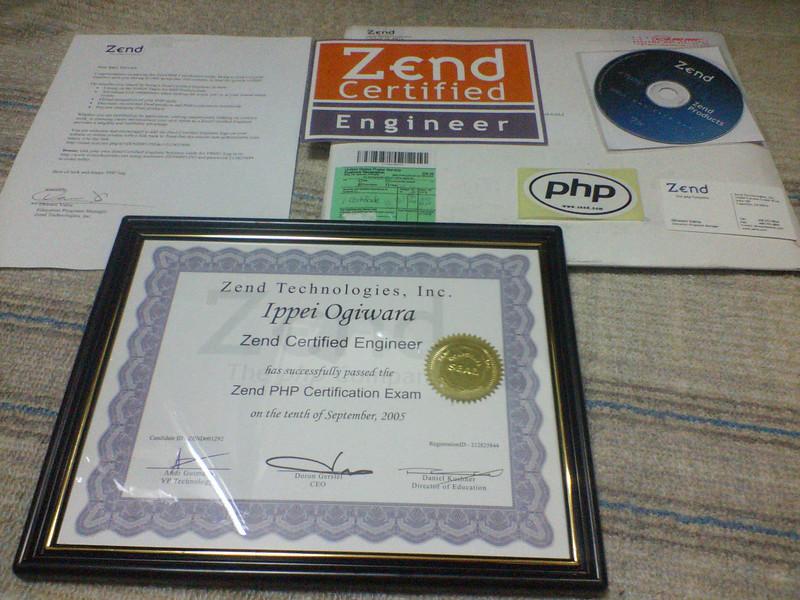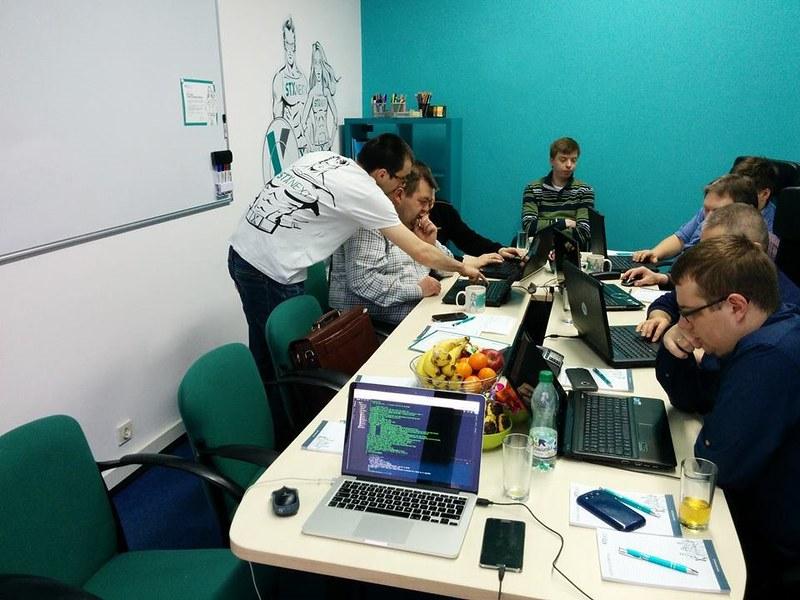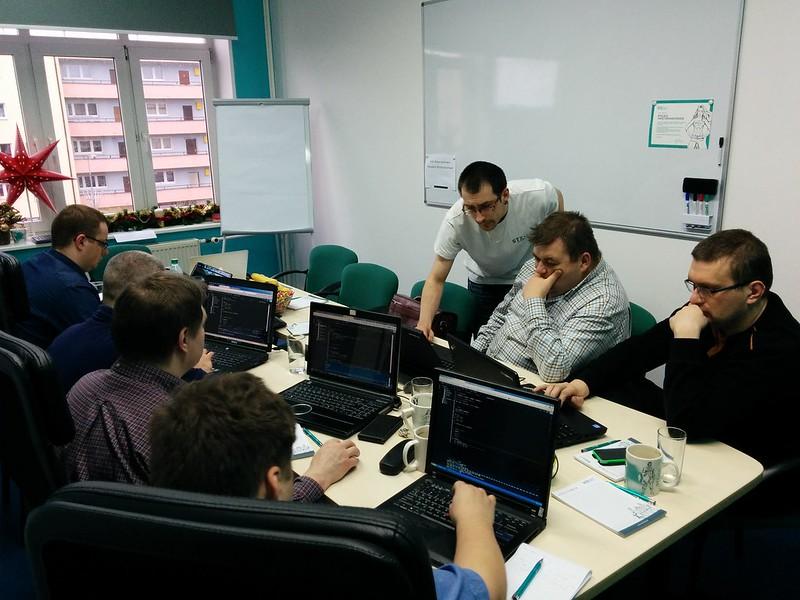PHP is one of the most popular programming languages today, so many young people ask me how to become a PHP developer.
Like any other career in web development, you must be proficient in PHP and have website-building skills. You probably find this path vague and do not know where to start.
Thus, I have compiled this detailed guide to guide you step by step to land this job successfully. Keep scrolling for more!
What Does A PHP Developer Do?
As a PHP developer (dev), my day job includes the back-end tasks of building and maintaining websites using PHP, specifically:
- Build websites from the ground up. I use PHP to handle server-side logic, database interactions, and user authentication.
- Write code to apply various features requested by clients or project managers. I create scripts that process user input, interact with databases, and generate content.
- Work with popular PHP frameworks like Laravel, Symfony, or CodeIgniter to streamline development and adhere to best practices.
- Work with databases like MySQL and PostgreSQL. I write queries to retrieve and manipulate data. So I ensure seamless integration between the website and the database.
- Identify and fix bugs in the code to ensure the website runs smoothly.
- Optimize the code for better performance, including minimizing load times, reducing server requests, and using caching strategies.
- Apply security measures to protect websites from common vulnerabilities like SQL injection cross-site scripting (XSS).
- Integrate third-party APIs for payment gateways, social media sharing, or geolocation.
- Team up with front-end devs, designers, and project managers.
- Use version control systems like Git to track changes and collaborate on code.
- Write clear documentation to provide guidelines for other devs who might work on the project.
In essence, the role of a PHP developer directly contributes to the websites’ features and user experience (UX).

How To Become A PHP Developer?
Now let’s go through the steps to become a PHP developer. I will guide you in detail so that you can visualize this path clearly.
Step 1: Get A Bachelor’s Degree
A Bachelor’s degree often covers various computer science and programming concepts. So it can help you develop a strong foundation in coding, algorithms, and problem-solving.
Besides, it has a structured curriculum that teaches you from basic to advanced topics. So you can grasp complex PHP concepts easier.
Moreover, many programs include practical projects that allow you to apply theoretical knowledge in real-world scenarios.
However, you don’t always need a degree. You can also learn on your own or go to shorter classes.
I’m working with some successful PHP developers who don’t have a Bachelor’s degree. Yet, not having this degree makes their journey more difficult because they have to figure everything out on their own.
To choose the right university or college to get this degree, look for one that offers programs related to:
- Computer Science
- Web Development
- Software Engineering
Also, ensure it’s reputable and includes PHP-related courses, web technologies, databases, and programming languages. Don’t forget to consider location, faculty expertise, and available resources.
Remember to determine the cost of tuition, living expenses, and potential scholarships or financial aid.
Once enrolled, take time to study and excel in your courses. I recommend engaging with professors, asking questions, and seeking help when needed. This way, you can have more quality relationships while being in college.

Step 2: Learn PHP
The better you are in PHP, the higher your chances of getting a job because many companies want dynamic and interactive websites.
Formal education programs often provide you with a wide range of knowledge to help you understand the field. So it usually won’t go too deep into PHP.
Thus, mastering PHP often requires self-study skills. Luckily, it has a large and supportive community. There are tons of online resources, tutorials, and forums to help you learn.
You can start with online courses and tutorials for beginners, like Codecademy, 3Schools, and freeCodeCamp. Take small steps; don’t rush.
Step 3: Practice Regularly

Practicing is vital if you want to be a good PHP developer. The more you practice, the better you get at writing PHP code and solving problems.
Besides, regular practice helps you remember what you’ve learned so you don’t forget vital things. Then, you’ll feel more confident in your skills.
How to practice effectively depends on your ability and learning speed. For those who don’t know where to start, check out my tips below:
- Decide when you can practice, even if it’s just a little bit each day.
- Start with the easy tasks and projects that interest you and work your way up to the more difficult ones.
- Solve coding challenges on websites like HackerRank or LeetCode. These challenges teach you different ways to approach problems.
- Keep learning from tutorials and online courses to get better.
- When your code has problems, fix them. It’s a great way to learn.
- Notice how much you’ve improved. It keeps you motivated.
Treat each practice session as a step toward achieving your goals. Whether it’s for 15 minutes or a few hours, regular practice adds up over time and sets you on the path to mastering PHP development.
Step 4: Get A Relevant Certification

Besides a Bachelor’s degree, certifications show you’re skilled in PHP. So they help you stand out in the job market.
One well-known certification is the Zend Certified PHP Engineer. Offered by Zend Technologies, it looks at different PHP topics, including:
- PHP fundamentals
- OOP
- Security practices
Otherwise, you can choose other options, like the ones from Codecademy or W3Schools. They have practical exercises and projects to help you practice.
Step 5: Networking
In this web development field, the more quality relationships you have, the more job opportunities you’ll get. They’ll probably introduce you to their company or invite you to collaborate on their projects.
To build a network, you can join online groups where people talk about PHP and web development. You can also use social media (Twitter and LinkedIn) to follow experienced developers and companies.
Besides, I recommend going to tech meetups, workshops, and conferences. There, you can meet people face-to-face and show them what you’re good at.
Networking is not just about asking for help. It’s also about helping others. When you help someone, they might help you in return. It’s like teamwork.

Step 6: Build Your Portfolio
Once you have the educational background, skills, and certifications in the field, the next step is to create a portfolio so you can apply for your first jobs to gain work experience.
First, you should make your own website to show your portfolio. Here, people can see all the cool things you’ve made and learn about you.
When picking projects for your portfolio, my advice is to choose different project types that show different skills, for example, a website you built from scratch, a customized blog system, or a web tool that uses various PHP parts.
Don’t forget to explain what you did for each project. Tell about the problems you solved and how you did it. This way, others will know how good you are at solving issues.
If you’ve worked on open-source projects (which means projects that many people work on together), you can include those too. It shows you can work in a team.
And don’t forget to update your portfolio. You need to add new projects and skills as you learn.
Step 7: Apply For Full-Time Jobs Or Freelance Work

Once you’ve created your portfolio, use it to apply for full-time or freelance jobs (depending on your interests and needs).
For newbie jobs, look for titles like “Junior PHP Developer” or “Trainee PHP Developer.” These roles are made for beginners like you.
Even if you’re not super experienced, your excitement to learn can really impress employers. These jobs usually come with support and training to help you get better.
Freelance work is another good choice. As a freelancer, you can do small projects for different clients to practice PHP and get real experience. Plus, freelancing lets you pick when you work and build a portfolio to show off your skills.
Remember, the goal is to start somewhere and learn along the way. These jobs can bring bigger chances as you get more experience.
Step 8: Continuous Learning
Even after you get this job, you should keep learning to stay on top because technology changes a lot, and PHP is no different.
Don’t just focus on PHP. Instead, I recommend learning about databases, making websites look nice, and managing servers.
And think about helping with open-source projects. You can help other developers while you practice and learn from them.
So, always be ready to learn more. Being a PHP developer means staying curious and learning new things.

Skills of a PHP Developer
Like any other profession, you need hard and soft skills to be a successful PHP developer. Here are some essential skills:
Hard Skills
- Programming language: Write and use PHP, HTML, CSS, and JavaScript
- Database handling: Manage data in databases like MySQL and use queries to get information.
- Frameworks: Use tools like Laravel to build websites more easily.
- Code control: Use Git to manage and work on code with others.
- Fixing code: Find and fix bugs in code.
Soft Skills
- Problem-solving: Figure out solutions for coding issues.
- Attention to detail: Notice small mistakes and make sure things work right.
- Critical thinking: Analyze problems and find the best solutions.
- Communication: Explain ideas clearly to teammates and non-tech people.
- Time management: Handle tasks and deadlines in a good way.
- Adaptability: Be open to new ideas and tech changes.
- Collaboration: Team up with designers and others on the team.

What Is the Difference Between a Web Developer and a PHP Developer?
In simpler terms, a web developer creates the whole website, while a PHP dev focuses on the interactive parts and uses PHP to create features on the site. So a PHP dev is a type of web developer.
Web developers are general builders of websites. In other words, they create the website’s overall structure and features.
Meanwhile, a PHP developer is a specialist who uses PHP to make websites do specific things. They handle the back-end tasks to make websites interactive and dynamic.
Job Outlook
The future for PHP developers looks really good. The number of jobs for web developers and digital designers (including PHP developers) will grow by 23% from 2021-2031. That’s faster growth than many other jobs.
Besides, around 21,800 new jobs/year will come up in this field. This fascinating opportunity is because more things are happening on the Internet, and companies need websites and online services.
Career Path
To help you visualize the career path of this profession, I will divide this path into three stages: entry-level, mid-level, and senior-level.
Entry-level positions
- Junior PHP Developer: Begin with small coding tasks and learn from experienced developers
Mid-level positions
- PHP Developer: Handle complex tasks and manage databases
- Technical Lead: Lead projects, help others, and make essential tech decisions
Senior-level positions
- Senior PHP Developer: Solve tough PHP challenges, teach others, and make things faster
- Architect: Design big projects, care about security and tech choices
- Development Manager: Manage teams and projects, and align with business goals
Your career path is flexible. And you can move into management or even start your own business.
FAQs
How Much Can A PHP Developer Make?
In 2023, the average income of a PHP developer is $108,930 per year, including $98,754 base pay and $10,176 additional pay, while senior positions can earn up to $185,000 per year.
Can I Become A PHP Developer Without Experience?
The answer is yes. You can start with an entry-level job and move to higher positions as you gain more experience.
Who Do PHP Developers Work With?
As a PHP developer, I work with other web devs, front-end devs, and web designers. I also team with project managers, clients, and sometimes database admins.
Conclusion
I believe you know how to become a PHP developer through my above guide. Whether you succeed on this path or not depends on your study and practice.
When you have the necessary knowledge and skills, you will surely get this position and succeed on your career path.
Thank you for reading this post!
